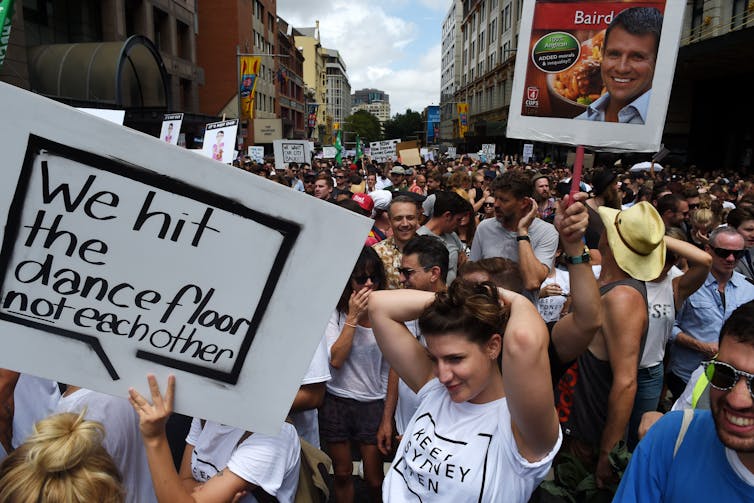Caring for 66,455 revellers at risk delivers $7.5m harm-reduction benefit for Sydney
- Written by Phillip Wadds, Senior Lecturer in Criminology, UNSW
Our time of social isolation under COVID-19 restrictions has reinforced the importance of taking care of each other, particularly the most vulnerable in our community. As we consider what our post-COVID social world will look like, we have an opportunity to deliver services that make our cities safer and more inclusive. An example of how we might achieve this can be found in a Sydney harm-reduction service that has assisted tens of thousands of nightlife revellers who are vulnerable, in distress or at risk of harm since 2014.
A newly released evaluation conservatively estimates the benefits of the Take Kare Safe Space (TKSS) program from December 2014 to April 2019 at A$7.46 million. That benefit includes the value of serious harm averted and the value attached to lives saved through program interventions.
While it may have been less prominent in our public and political consciousness this year, nightlife, and the way we socialise after dark, is a major part of our social and cultural life. It will return.
In Sydney, where trading restrictions – the so-called lockout laws – were lifted in January following five years of controversy, we need to do nightlife better. We need to find the balance between safety and vibrancy. The city is a great place to go out, but also a place where we need to provide the right services for when things inevitably go wrong.
Read more: Where are they now? What public transport data reveal about lockout laws and nightlife patronage
One part of the solution
The TKSS program has been doing this throughout the lockout period in Sydney. Now operated by Stay Kind, the TKSS program was launched in 2014 following the unprovoked attack and subsequent death of Thomas Kelly in Kings Cross in 2012.
Operating year-round from 10pm to 4am on Friday and Saturday nights, it’s a non-judgmental, non-government, harm-reduction service. The program looks after nightlife revellers who are vulnerable, in distress or at risk of harm.
Teams of Take Kare ambassadors work in co-operation with the City of Sydney’s CCTV control room and other nightlife services to patrol key precincts, acting as critical intermediaries between emergency services.
During the evaluation, TKSS operated three static safe spaces at Town Hall, Kings Cross and Darling Harbour. Here, nightlife revellers can go to chill out, get help, charge their phones, or receive basic first aid.
A 2019 Current Affair report on Sydney’s Take Kare Safe Spaces.Between December 2014 and April 2019, TKSS supported 66,455 people. Two-thirds of them were aged 18-25. Many (46%) were perceived as heavily intoxicated and at risk of harm.
What is the evidence? Does it work?
Researchers from UNSW Sydney and Central Queensland University recently completed a comprehensive independent evaluation of the TKSS program. Funded by the NSW Department of Communities and Justice, the evaluation team analysed crime, emergency department and ambulance data to establish the benefit-cost ratio of the program. We also interviewed key stakeholders and “clients” about their perceptions of the program.
From December 2014 to April 2019 (inclusive), the benefits were estimated at $7.46 million. With operating costs of $2.79 million, the benefit-cost ratio was 2.67:1. In other words, a $1 investment in the program resulted in $2.67 of benefits. When the TKSS program was fully operational in all three safe space sites (in 2016-17), the benefit-cost ratio increased to 3.83:1.
These results are conservative. The return on investment is likely to be much higher given the analysis does not quantify the full spectrum of benefits associated with the program. These include: improved public safety and amenity; more efficient resource allocation for service providers; improved partnership, communication and resourcing to manage Sydney nightlife; and flow-on effects for tourism and investment.
 While the lockout laws were contentious, the easing of regulations has probably increased the need to protect revellers from harm.
Paul Miller/AAP
While the lockout laws were contentious, the easing of regulations has probably increased the need to protect revellers from harm.
Paul Miller/AAP
Read more: 'Sanitised' nightlife precincts become places where some are not welcome
What are the strengths of TKSS?
These non-quantifiable benefits featured strongly in interviews with stakeholders. They included staff from NSW Police and Ambulance, St Vincent’s Emergency Department, City of Sydney, licensed venues and those who used the service. They highlighted a number of key program strengths, including:
1. the program fills a critical gap in nightlife safety – TKSS staff act as intermediaries between licensed premises and emergency services by providing services in public city spaces where people are most vulnerable – and it’s also easy to deploy in different locations as needed
2. the non-judgmental, non-authoritative nature of the program meant intoxicated, vulnerable and distressed nightlife patrons were more comfortable speaking with TKSS ambassadors than other services – such as police, ambulance, venue security or city rangers – and this rapport helped encourage at-risk patrons to willingly get medical help when needed
Read more: Fewer alcohol-related visits to inner Sydney emergency room since 'lockout laws' introduced
3. police, ambulance and accident and emergency staff said the TKSS program allowed them to focus on more urgent and pressing jobs
4. the ambassadors are able to de-escalate conflict and provide welfare services through their early, proactive and non-judgmental interventions.
The evaluation shows the TKSS program provides a critical harm-reduction service in Sydney after dark. Its net economic benefit to the city is greatest when the full complement of Safe Spaces are operating and supported by sustained and stable funding. There is a clear case that the program should be part of the long-term future planning of a safe, inclusive and vibrant night-time economy.
Note: The TKSS program was suspended in March 2020 due to COVID-19 and is due to re-open in January 2021.
Authors: Phillip Wadds, Senior Lecturer in Criminology, UNSW



















